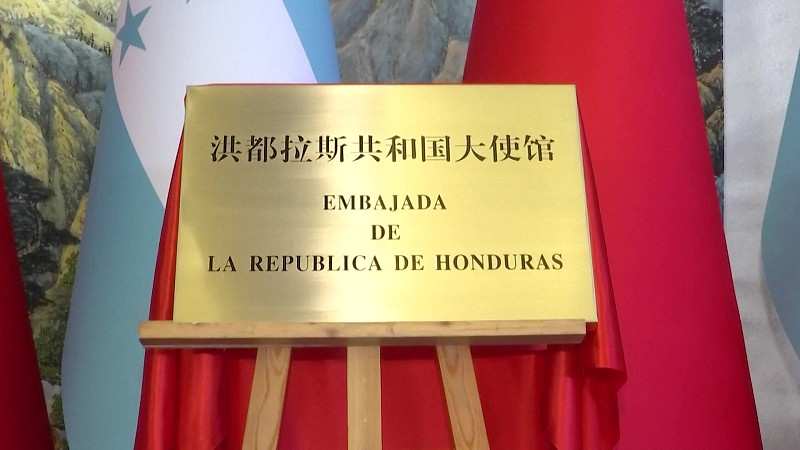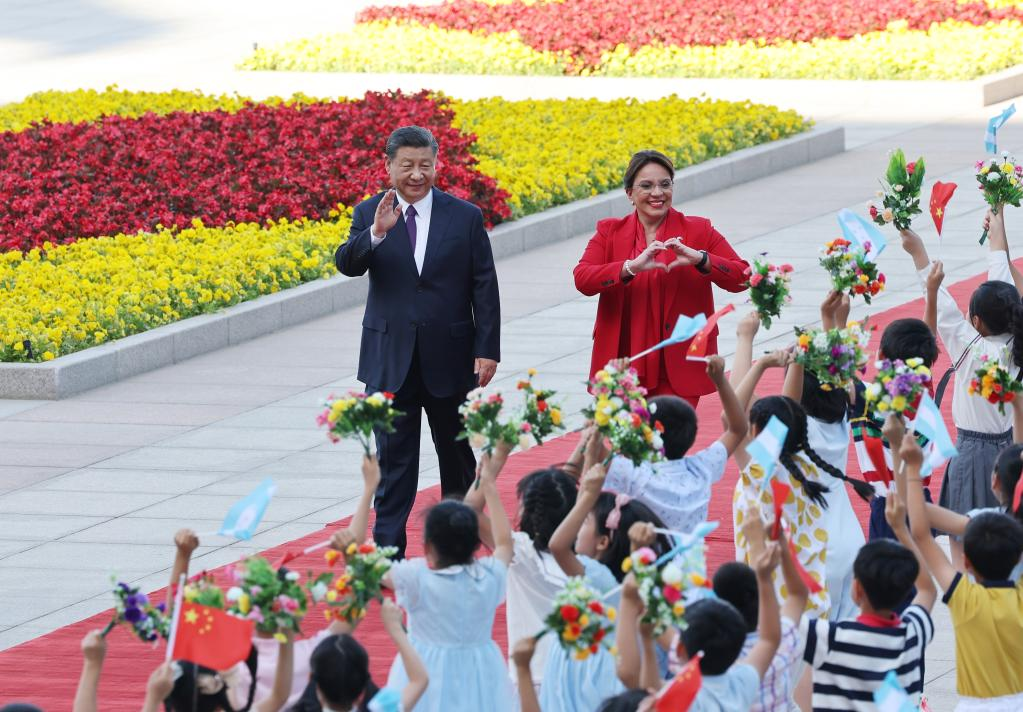
The Embassy of Honduras opened in Beijing, China, June 11, 2023. /CFP
The Embassy of Honduras opened in Beijing, China, June 11, 2023. /CFP
Editor's note: Ruqiya Anwar, a special commentator on current affairs for CGTN, is a PhD scholar of Media and Communication Studies in Pakistan. The article reflects the author's opinions and not necessarily the views of CGTN.
The establishment of the Embassy of Honduras in Beijing initiates a new era of collaboration and shared commitment to sustainable development and conservation of the environment. China and Honduras on June 12 issued a joint statement after the meeting of the leaders of the two countries. China, a global leader in green technologies, and Honduras, a country endowed with an abundance of natural resources, have joined forces to promote sustainable practices, conservation efforts, and climate change mitigation strategies.
China and Honduras have the ability to make substantial progress in addressing environmental challenges, promoting renewable energy initiatives, and contributing to the global fight against climate change by leveraging their respective strengths and learning from one another's experiences. In addition, it presents an opportunity for collaboration on a variety of projects and initiatives aimed at promoting environmental sustainability and responsible resource management.
As this partnership grows stronger, the world will witness the positive impact of such collaborative efforts, inspiring other nations to prioritize sustainability and nurturing a brighter, greener future for future generations.
The natural resources of Honduras are diverse and abundant, including verdant forests, pristine coastal regions, and remarkable biodiversity. The opening of an embassy in Beijing paves the way for China and Honduras to collaborate on sustainable resource management. By exchanging knowledge, innovative technologies, and best practices, the two nations can work together to protect and preserve these irreplaceable assets of nature.
China-Honduras collaboration fosters knowledge and technology transfer. China's research, production, and green technology implementation can help the development of Honduras. Capacity-building programs, workshops, and cooperative projects can help Honduras adopt new solutions and cutting-edge technologies. This knowledge transfer will improve Honduras's technical capabilities and allow local industries to adopt sustainable practices, promoting green sector economic growth and job possibilities.
Notably, this partnership may set a precedent for sustainable development and environmental stewardship through its commitment to responsible forestry practices, sound coastal management, and the deployment of policies to conserve biodiversity. China's rapid development of green technologies has made it a front-runner in the effort to transition to a low-carbon economy.
Knowledge sharing, technology transfer, and strengthening institutional capacities are all enhanced by the China–Honduras cooperation. Honduras can speed up its own efforts to cut carbon emissions, boost energy efficiency, and promote the use of clean energy sources by learning from China's achievements in these areas.

Chinese President Xi Jinping holds a welcoming ceremony for President of the Republic of Honduras Iris Xiomara Castro Sarmiento at the square outside the east entrance of the Great Hall of the People prior to their talks in Beijing, China, June 12, 2023. /Xinhua
Chinese President Xi Jinping holds a welcoming ceremony for President of the Republic of Honduras Iris Xiomara Castro Sarmiento at the square outside the east entrance of the Great Hall of the People prior to their talks in Beijing, China, June 12, 2023. /Xinhua
The two countries are capable of working together to solve environmental problems that affect both because of the embassy's commitment to sustainable development and conservation of the environment in China. Global concerns including climate change, deforestation, biodiversity loss, and pollution necessitate international cooperation.
Reflecting on China's experience with ecological restoration and its social-ecological effects could provide vital insights for future adaptive restoration efforts aimed at achieving sustainable development. China's ecological restoration initiatives have had a significant impact on ecosystem services, particularly carbon sequestration, soil retention, and water yield, as well as their interactions, and it is evident that spatial-temporal trade-off relationships must be considered. China's retention of carbon has increased dramatically as a result of ecological restoration. Multiple ecosystem services have been enhanced by China's ecological restoration, which has the potential to improve human welfare.
Climate change can be reduced, fragile ecosystems can be protected, and sustainable use of natural resources can be ensured if countries like China and Honduras cooperate together to pool resources, share scientific knowledge, and adopt effective policies. Together, they can send a strong message of solidarity and resolve to solve the world's most pressing environmental problems.
The sustainable development and environmental protection cooperation between the two countries in discussion extends beyond their respective borders. It resonates with the greater international community, emphasizing the necessity for collective action to address climate change. This effect can galvanize a global movement towards sustainable development, reinforcing the necessity for nations to collaborate in reducing climate change and preserving our planet.
By minimizing greenhouse gas emissions, promoting renewable energy transitions, and pushing for strong environmental policies, both countries can help foster global climate change initiatives, such as the Paris Agreement, through their combined efforts. This partnership will demonstrate that progress is achievable when countries unite for a common cause and serve as an inspiration to other nations.
China's achievements in green technology can inspire Honduras to accelerate its path to sustainable development. Honduras can develop comprehensive policies and regulatory frameworks designed to encourage renewable energy acceptance, energy efficiency, and sustainable urban planning by incorporating China's standards of excellence.
(If you want to contribute and have specific expertise, please contact us at opinions@cgtn.com. Follow @thouse_opinions on Twitter to discover the latest commentaries in the CGTN Opinion Section.)